

| Gergely Zöldi: | "I'm in the process of throwing away everything old and slowly collecting the new" |
Conversations with actress Erika Bodnár
 Róbert Bán: Parellel Faces (1972) 69 KByte |
In the 70's and 80's she was constantly appearing in films, standing before the camera in almost 40 Hungarian pictures. In these film-wise poor times we have to do without her - and many other significant screen actors - in the cinemas. For the past two decades, her real home has been the same stage, since she is a founding member of the coherent, yet ever-renewing company of the Katona József Theatre. We sat down to talk in her theatre dressing room, before the performance of Tom Stoppard's Arcadia. You made your first film appearance with Pál Sándor. This was Sarah My Dear, made in 1971. Yes, that was the first one. Did you have no earlier film experience? Not at all. At the Theatre Academy we had a film-acting course which was planned for two years but we ended up doing only one semester. I don't know why it didn't work out. We were taught there by Károly Makk, Sándor Simó and Pál Sándor - but at that time a lot of films were being made, they worked night and day and simply didn't have time to teach. Still, we could at least try working before the camera just like on a normal film production. How does it feel to see yourself on screen for the first time? Horrible. I could never get used to it. For me it is still a trauma, a shock to watch myself. I'm always dissatisfied. Can't you name any films in which you were satisfied with yourself? I had one role that I can still appreciate. This is Parellel Faces, based on Mándy's work. I've seen it several times since and I felt that it worked really well. I also liked a TV-movie, Judit Felvidéki's Fabuland. It deals with a lonely woman's anxieties that ultimately turn into madness. I loved it also because it had a lot of improvisation, Felvidéki and I made up many things together. When I watched it again, if not being totally satisfied with the whole thing, I could still find parts in it that I thought I solved well. Going back to 1971, you actually stood quite inexperienced before the camera for the first time. I think the reason why it still could go quite smoothly and without failure because my partners were András Kern and István Verebes who had been my college classmates, they were also filming for the first time, so we made up quite a new and fresh team. We were patient to each other because we knew one another well. What's more, we were playing ourselves, we couldn't make very big mistakes. That was when you started your stage career, too. Yes, I went to Szolnok in 1970, so I had been over my first theatre season by then. Didn't it bother you that at a shooting you had to work according to quite different viewpoints then when you performed in the theatre? Not in this film, but really, not even later. You certainly know that in a film everything depends on moments and since you don't have to play a span in whole, just tiny fragments or scenes, you can manage with that even having shorter preparation time. I've never had problems with that, plus, we did have time to rehearse then, to prepare your soul, the shooting of a scene started when the actors were in the right state to work. I think there is less time for that now, but I really don't know. I haven't worked in films for a long time. You played your last big roles on film in Anna's film and Before The Bat's Flight Is Done... Yes, I last had big roles in the Esterházy-film, but rather in the Bat. But then filmmaking still had its normal pace, I didn't see any difference from my earlier shootings. It's always very important what kind of crew, what kind of people are working around you. It was only after many films that I realised how much it influences the actor and the director. I realised, that it is not just the director of photography that's important - it's quite natural - but also whether from the makeup-artist to the script girl and assistants how much everybody wants to do something good, how much they take part in the work and how much they consider it as theirs. Can this work even against the director? Absolutely, alas. The director chooses people but he may not be able to get them because they are busy. I can't really see inside this problem. It can be difficult if the director has to control twenty-thirty people besides concentrating on his closest co-workers and actors. Can you remember how you were chosen for your first role in Sarah? I think originally I wasn't even supposed to do a screen test, we just did it because of some technical reasons. Wasn't it a custom then? Oh yes, almost in every film. For my later works I always had to so screen tests. Even if they knew that you are the actress, the director wants you, still they did the scene with two or three other actresses to be sure of their choice. It also happened that they found somebody better for the role. But in the case of Sarah Pál Sándor told me in advance that he wanted me for the role. My hair was very long then, and they did the test in order to see if such a lot of hair could fit under a short wig. Could you feel even then that film meant much larger fame and appreciation for an actor than even the best stage role? Of course, but it was quite natural, I didn't really think about it because I found it evident. And every actor could work a lot. I must have made at least five films a year and the same number of teleplays, if not more - so in many cases you could and had to select, you just couldn't schedule everything besides working in theatre. Working in films wasn't a privilege. Everybody did that, everybody had chances. Of course, more people watched television, but who knows…at that time it wasn't so obvious to have a TV in every household. People liked going to the cinema and it was natural to go to the theatre - at least s common as watching TV in the evening. A lot of teleplays were made with Hungarian actors and the audience loved them. I have to add that even in cinemas you couldn't see so many American films then. Only their old movies were on, so the kind of competition between Hungarian and American films that we have now didn't exist - I mean a competition that could exist if there were any Hungarian films at all. But maybe there would not be problems, because when Hungarian films are showed on TV-channels, it turns out that people love and watch them. Sometimes they come up to me in the street, or my colleagues tell me in the theatre that they saw one of my films the other night. Recently they showed Dashing Girls, with Eszter Csákányi in one of the roles. You met each other in that film, didn't you? That's what saved me in that picture. Not as an actor, because from that point of view nothing could save me, but I mean as a person. It was a great team. I met Eszter Csákányi on that location, and her energy, her vitality amazed me. She came happily to work at five in the morning when all of us others sat with swollen eyes in makeup. I also met Ildikó Bánsági there and we till keep these nice memories. I can't say too much more about the film that's good. A few years later you started a co-operation with Rezső Szörény that included several films. Yes, besides his very first movie I was in all of the others - in smaller or bigger roles. Later we became friends, not from the first moment, but as the films were being made. Our last common one was Be Tough, Victor, I really don't know whether he worked after that at all. During that shooting we were working as friends. I think it is simply a good feeling to be sure that if you're hurt or pushed hard, it's not about being mean, it just serves the purpose of the film. It's also great to work with people you know well - this was our fifth film together, so I knew everybody well. I worked easily with them and I was quite relaxed. I could act and try out things more bravely. Otherwise I don't think that it is a necessity to be friends with the people you work with. It might only be a bonus if it is so. But in many occasions you can make a lousy film with a friend. That's not what makes the difference. If you knew what is the difference, then there would be only good films and everything would be quite easy. Looking through it, the staff that you have worked with in different films of yours very well represents Hungarian film art of the past decades. It's really a bliss that I have worked with so many different directors. With members of the so-called new wave of the time, and also with the great classics. I met with several styles, tastes and ideologies - there were some that I didn't like or I didn't agree with, some that were far from my world or thoughts, but still it has been a useful school. Seeing and presenting the exact same thing in many different ways. This has been an experience that I can use in my life rather than in my profession. I couldn't really build it into my acting, but it helped me understand certain people. Has there been any consciousness in that? Have you ever felt that at certain points you had to do this or that kind of movie? No, I was more naive. I trusted the people who chose me. I have never had any idea about how to build a career. I read the scripts and if I liked the role than I didn't care if it was a comedy or a drama - if I felt that I could do it then I accepted the role. First of all I concentrated on what the material, the sentences and the plot was like. How important it was to me and how much I could say with it what I was expected to. More precisely, how I could justify what was written down. By the way, comedy has never really found me, almost the only one was King Matthias Was Here, directed by Pál Sándor. I can't remember any more. I had a short appearance in Love, Mother, but it was really tiny, I don't consider it as one of my important roles. In Andor Lukáts new film, Portugal, you also have a short "glimpse". That's literally a glimpse! I was happy to do it because I like the performance in the Kamra Theatre. I appreciate the director's and the actor's work in it. I was excited to work in that team. From what you said I can conclude that you wouldn't really have found your place in a film business based on market values. I'm talking about one where it is your task to do something about when you play, what you play and with whom. I would have died in that. I wouldn't be anywhere. Sometimes I read in the papers that people like Marlon Brando and Meryl Streep don't hesitate to go after the director and beg until they make a test of them. But whoever grows up in America is used to this. They have always had to fight like that in every aspect of their lives. They have been preparing for life like that since their childhood and they are expecting this kind of thing. For us who have grown up here in Middle-Europe, in a much more introverted and inside oriented culture, this is impossible to get used to. Nobody was supposed to know what you think, we were taught to keep our thoughts to ourselves. Young people can change, but for my generation it is difficult. There are some that still try, but it's tiresome. And there are others like me, who are incapable of it. Some might think - maybe they're right - that this is being vain. "Who does she think she is that she wouldn't go to a casting?" And I say that after all a director could very well come to see me in the theatre. Do you keep up with contemporary Hungarian films? Do you see the new pictures? Not really, unfortunately. I am quite lazy in this respect, it's shameful how little attention I pay. Besides my theatre, the Katona I don't even go to the theatre - but here I naturally see everything. I don't even go to Kaposvár, but when they come up to Budapest I always see their productions. That's it. Shall I say - I don't know, maybe I have done thirty-seven films - that I haven't seen at least half of my own movies? I that because you don't like to watch yourself? No, because I knew that the film wasn't good and since I already knew that during shooting, I didn't want to see it. So is it indifferent whether you are in it or not? Completely. If I know that it's not good I won't see it. Why should I? By way of my excuse, I have never taken part in any film that I didn't consider to be interesting, or something that might "happen". I never accepted anything without seeing the slightest chance of being worth dealing with. Did you think that even at the beginning of your career? Yes, even then I refused several roles. But again, then there was a lot to choose from. So much so, that when I didn't accept something they never even asked for reasons. They were sure that you had at lest three other scripts with you and maybe you just can't put it into your schedule. Now it's different. Nowadays if you receive a script you should accept it without reading it first. It's only worth arguing about the money. Still, even though I'm not so very well off, I still keep the luxury not to ever take part in anything I'm not interested in. I think that everyone should have a certain limit that they don't go below. If I look through you filmography I see a very rich 70's and 80's period and then it sort of stops in the 90's. Do you mean that it is also a decision that you have made? Oh no, it would be too pretentious to say that. What happened is that I stepped into an age where I could no longer play young women and I was too young for old women. A lot of actresses have talked about it, it's obvious and everyone has to face it. Maybe those directors could make this period easier that you had worked very well with before. Possibly, but I think that a director needs change, too. Of course Pál Sándor's saying "you need a team" is relevant, most directors put such teams together. But I think that it's natural that everybody wants to change in order to get freshened up. We know each other very well, I know what he's going to do if I do this - you need fresh, new powers, new impulses in order to make things exciting gain. It must be all the more important for a director. After all, Bergman made changes several times. An actor can be sad about it, sometimes I do too, but I can still understand it and I find it obvious. You can't start together at twenty and work together for seventy years because after a while the whole thing brakes down. This is a great thing in the theatre, because new faces come, young actors from the drama school. When this happens I'm always hopeful and happy that now they come and shake me up, make me feel a little ashamed. I'm curious how they see the same thing? They have different views which is very important, which is absolutely necessary. That's the way this profession is, everything is relevant and interesting only at a certain moment and if they don't change constantly, they become indifferent. You mustn't keep "exhausted teams" alive. So, in the theatre you seem to have found this changeability. Have you always preferred the stage? It has always depended on the roles. But certainly I have. I love rehearsing, I love the six weeks or two months during which you get somewhere with a role. This is when miracles and unexpected things can happen to you: "wow, is that the way I am?". This is not always a pleasant surprise but if you accept it you will become wiser and richer. Do you struggle during the rehearsals? Every rehearsal period has a part where I start to struggle. Usually I seem to start rehearsing quite easily and after two or three weeks, when I know enough about the role to go deeper, the whole thing naturally gets harder and harder. It's very tough to accept things about yourself, tough to look into your soul. And of course we are very "lazy", one often satisfies with what seems successful at the moment - you start to think that it's enough. That's when you need a director to push you and make you try to go further on this way. This year you are preparing for a big stage role, Lorca's Bernarda Alba. Oh my God, don't mention it! I'm scared of it. But I'm also very happy, these are naturally very ambivalent feelings. Before such a big classical role joy and fear mix in you. Have you started preparing? No. I never prepare in advance. Not even by reading the text. If I do that then I will have a picture about the role - even if I don't want it. I find out how I want to play. And this may cause great problems because one day you go into the rehearsal and find out that the director wants something completely different. And there are the colleagues that you play with and who influence your acting. What you find out alone at home may not work in the performance. If one gets very decisive it is hard to get rid of the preconceptions. Even if you are very lucky this will take up two or three weeks - that means such a waste of time until you forget and start all over again. And it also means that I'm not ready by the premiere. Therefore I keep talking myself out of such preconceptions and I don't work with the role beforehand. I see it at the first read-through as if I hadn't even known it. What I always do is read other works of the period or of the writer. For example I love Lorca's poetry and lyre. I re-read the poems that I almost know by heart. He composes with such detail and precision, each of his sentences has such visual power that they make you understand a lot - hopefully in connection with the play as well. He keeps writing about hidden passions, "coveredness", even in his seemingly beautiful and lyric poems. You play the exact opposite of this world in your probably most successful role, Arcadia's voluptuous Lady Croom. I like this production very much, but still, let me say something about it. I'm very happy that with Bernarda, if I manage, I may step over to another age. As a matter of fact, in Arcadia and all of my other roles except for one, I play younger women than myself. Now I finally got it! Still, I don't think that you have to give up on younger female roles - if the director sees the character in you. On of the reasons why it is so great to be here in the Katona is that I completely trust the people who work here. I can be sure to get things that they know I have to play - and they also know what I shouldn't. I can completely depend on them, I never think that I'm not used or used far too much, or I get roles that I shouldn't do. I have never thought about this but I can't even mention a role that I considered as something that I shouldn't play. I believe that Gábor Zsámbéki, Tamás Ascher and now Árpád Schilling know why they choose me for a role. Have you never been disappointed? Of course I have. I can say things that didn't succeed but it wasn't their fault. It's like hell to feel that this is it, I can't cross my own borders. Are you able to judge this every time? I think I can judge what state I'm in, how I'm able to work. What state my talent is at the moment. I have been in much better state at the beginning of my career. It was The Seagull in Szolnok, then when Zsámbéki and Székely came to the National, that was also a great period of mine. The peak of that time was The Kitchen and Halleluia. In the Katona it was The Flight, The Three Sisters and the Pinter plays. Then I got tired for a while. Now I feel again that there's a lot of energy and strength in me. I hope that the miserable ten years have passed - years that I had to cope with. I can't think of anything sadder than just being somewhere and trying to cope. I think that's an actor's death. It's not enough to just be good in something. You want more. Now I hope that I can step a little higher and that I know more about certain things. During these ten years I had time to go around in the city, the market, to see things - I was especially happy about that. Arcadia was probably the first role after a long time in which it didn't matter what I did, what I said, it was me. This is such a free and happy feeling, it gives me such great bravery that I dare do different things. It's simply great to exist in that company and in that atmosphere. And it's great to feel positive reactions from the audience during the performance. This is what you don't have when you're filming. Sure, there you are much more dependent on the director. He has to see if something that you do in a scene, something that might even be good, fits into his concept and to the rhythm of the film or not. Because it might happen that small scenes work very well in themselves but when the film is put together the many effects work against each other and nothing happens. Other times you feel that you haven't done anything special in a scene and in the final version you notice that a very special moment has been born. In theatre you can build up this effect yourself, from seven to ten on a certain night… On a given night that's my own responsibility. Theatre is constant work, certain moments of a performance are always changing. I have just watched the TV-recording of The Three Sisters and I was sorry that we don't play it any more - I would do so many things differently. You know I have realised that for me, this profession is about starting when you're young and using enormous energy to learn acting wherever you can. Many years pass by until you learn how to speak, when to sit down, when to stand up, how to move - simple things that are not so simple after all. Half of your life passes by until you get practised and all of it is yours. The problem comes when you have learned it - some do with extreme brilliance - and from then on we use it, this is what we build upon. It is ours. A sort of collection of professional routine and knowledge. Now, whoever stays there is doomed. Then it will become mannerism and things that everyone knows all too well. Real acting means that once you have learned it - and that's difficult! - you have to try and forget it. You must build up something new from new elements. You must throw away everything that's used, broken, dodgy and old-fashioned. It's like getting rid of your old furniture, it's hard to say goodbye to things that mean a lot to you. But ultimately you have to throw away everything that's dragging you down. And there you are, naked and you must start a new life. Now I'm in the period of throwing away everything old and I'm slowly collecting the new. |
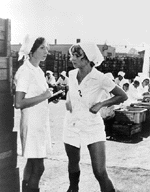 Péter Bacsó: Dashing Girls (1974) 35 KByte | |
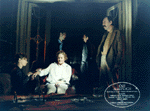 Béla Tarr: Almanac of Fall (1984) 43 KByte | |
 Péter Tímár: Before The Bat's Flight Is Done... (1989) 53 KByte | |
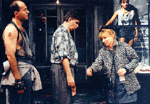 Lajos Parti Nagy: Mausoleum (staged by Katona József Theatre, directed by: Gábor Máté ) 73 KByte | |
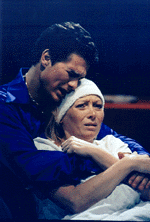 Attila Lőrinczy: Axe in to the Head (staged by Katona József Theatre, directed by: Gábor Máté ) 28 KByte | |
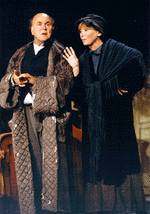 Moliére: L'Avare (staged by Katona József Theatre, directed by: Gábor Zsámbéki) 37 KByte |